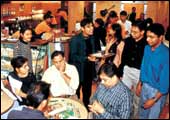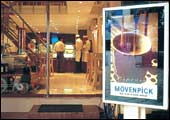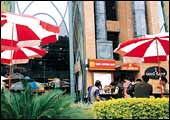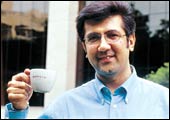 |
| Ravi Deol, CEO, Barista Coffee Company:
Bringing the coffee culture to India |
| Success hasn't come easy for Barista. It
has had to educate consumers on coffee-tell them the difference
between espresso and cappuccino. |
Six
months ago, a middle-aged Italian from New York came running into
a Barista in the riot-torn city of Ahmedabad. Having found a relatively
safe place to sit, the man ordered an affogato (a scoop of vanilla
ice cream drowned in a fresh shot of espresso). As he was sipping
it, he suddenly burst into a hysterical mass of tears. When one
of the anxious baristas (Italian for bartender) enquired, the man
revealed that the last time he had an affogato was 20 years ago
in his provincial home town in Italy with his grandmother. The whole
experience of finding an authentic affogato in the middle of bloody
riots was, then, simply too overwhelming for him.
If Barista Coffee Company, which runs the Barista
coffee bars, needed a testimonial to the authenticity of the Italian
coffee drinking experience that it is trying to market by the cup
in India, it couldn't have got a better one. But the question is,
in a country where 70 per cent of the people drink tea will coffee
ever stage a cultural coup?
It just might. Since opening its first store
in Delhi in February 2000, Barista has mushroomed to 105 stores
in 18 cities-that's one store every nine days-serving 30,000 customers
a day. Revenues in 2001-02 soared to Rs 65 crore from Rs 25 crore
the first year. By the end of current fiscal, it wants to raise
the store count to 250 including a couple in SriLanka and Dubai.
Ask Ravi S. Deol, Barista Coffee Company's
39-year-old CEO, if it's an Indian Starbucks he has in mind, and
he mumbles a reluctant yes but quickly adds that he doesn't think
the $2.6-billion American coffee chain, which at last count had
5,689 outlets in 28 countries, is global enough. "We want to
be global in every sense of the word," he says without a hint
of embarrassment.
Yet, there's little doubt that Barista's role
model is Starbucks. Walk into any Barista, and you would find the
atmosphere informal, the colour orange (for Joy) and the décor
unpretentious. Substitute the colour orange with green and white
and you could be sitting in Starbucks. Fun posters, a message board,
and TV screens with music videos set the mood. There is an open
kitchen behind the bar so you can watch your coffee being made.
Deol says that unlike Starbucks', the Barista experience is closer
to that of the Italian espresso bar. (But that may not be entirely
true, since Starbucks was also inspired by its founder Howard Schultz's
trip to Italy.)
| BATTLE OF THE BREW: HOW THEY STACK UP |
 BARISTA BARISTA
ANNUAL SALES: Rs 65 crore
STORES: 105 (in 8 cities)
FOOTFALL: 400/cafe/day
CUPPA CAPPUCCINO: Rs 40
PLANS: 250 stores by fiscal-end; go global, starting
with a store in Sri Lanka by October this year
 MOVENPICK MOVENPICK
ANNUAL SALES: Rs 4 crore*
STORES: 2 (Chennai & Bangalore; Delhi outlet temporarily
closed)
FOOTFALL: 400-500/cafe/day
CUPPA
CAPPUCCINO: Rs 40
PLANS: 8 more stores by the end of the year and to
expand the size of the outlet in Delhi
 CAFE
COFFEE DAY CAFE
COFFEE DAY
ANNUAL SALES: Rs 10 crore+
STORES: 50 (in 9 cities)
FOOTFALL: 600/cafe/day
CUPPA CAPPUCCINO: Rs 20 (Rs 25 in Delhi & Bangalore)
PLANS: 100 stores by December, 200 by March 2004. 50
outlets in Mumbai alone by 2002-end
 QWIKY'S QWIKY'S
ANNUAL SALES: Rs 4.3 crore
STORES: 21 (in 5 cities)
FOOTFALL: 600/cafe/day
CUPPA CAPPUCCINO: Rs 30
PLANS: To double number of stores by next year; expand
to Pune and Kolkata
|
Changing Lifestyles
Just like Schultz, Deol-and Amit Judge of the
Turner Morrison group, which has promoted Barista Coffee Company-seem
to have proved right about coffee's universal appeal. But the success
hasn't come easy. Barista has had to, first of all, educate consumers
on coffee-tell them the difference between espresso and cappuccino.
Then, it has had to create a knowledgeable counter staff that could
interact confidently with customers. Its 600-odd baristas are specially
trained and skilled, and then tested at making coffee before they
are allowed to serve customers.
Now that the consumer can differentiate between
an espresso and a cappuccino, the aim is to transform the indulgence
into a habit. And one of the ways it is trying to do that is through
sheer reach. Barista will set itself up any place where there is
enough of a footfall-shopping malls, big retail outlets, banks (like
ABN-Amro), movie theatres (PVR in Delhi), offices (HSBC and GE),
airports, and hotels. "We have to be wherever our customers
want us, and that is the template," declares Yogesh Samant,
BCC's 30-something coo, who comes from Hindustan Lever Ltd.
To be sure, Barista has a whole lot of things
going for it. Compared to its competitors, Qwiky's, Café
Coffee Day, and Movenpick, the early bird Barista has a higher brand
profile. It also has deeper pockets, thanks in part to Tata Coffee,
which in August 2000 picked up a 34.3 per cent stake for Rs 26 crore.
Besides capital, the alliance gives Barista a shot at supply-chain
integration, with TCL supplying the beans and the Taj hotels (part
of Tata's Indian Hotels) feeding it with food items like baguettes,
croissants and desserts. Points out M.H. Ashraff, Managing Director,
Tata Coffee: "The association results in Barista having a captive
production base, which gives it an advantage over its competitors."
And the fact that the per capital coffee consumption in India at
42 gm (compared to 4.5 kg in the US) is abysmally low, leaves plenty
of room for growth.
 |
"We have to be wherever our customers
want us, and that is the template"
Yogesh Samant,
COO, Barista |
Still, the going won't be easy for Barista.
So far it has invested Rs 60 crore in building its chain of 105
stores, but accumulated losses are as much as a fifth of its equity
capital of Rs 36 crore. The operating profit is a decent 17 per
cent of sales, but Barista's expansion spree means that the bottomline
won't be turning black anytime soon. By Deol's own admission, the
company is not expected to break even at the net level before the
end of fiscal 2003-04. Then, Barista imports everything from chairs
to coffee beans to coffee machines. That makes it vulnerable to
currency fluctuations; even a marginal depreciation in the rupee
will make Barista's imports costlier and crunch its margins.
In fact, barely a month ago, coffee prices
had to be increased from Rs 30 to Rs 40 per cup. Fortunately for
Barista, there was no impact on sales, but in a market like India,
price is usually a big issue with consumers. Says Neeraj Jain, ceo,
Movenpick: "Prices will play a major role in another two years
when people begin to differentiate between instant and brewed coffee."
Some other industry experts believe that the moment some other high-priced
player (Starbucks?) enters the market, Barista will find itself
sandwiched between the premium and mass market brands.
Competition is at Barista's heels too. As things
stand, Barista is geographically well distributed. A third of its
stores are in north, another one-third in west, and the rest is
distributed between south and east. But its rivals are now beginning
to make inroads.
|
BARISTA VS STARBUCKS
|
| Despite Barista's
claim that it follows a retail model of its own, there are striking
similarities between it and the American coffee chain giant,
Starbucks. Like the Seattle-based company, Barista operates
all stores on its own. Both the chains have been inspired by
Italian coffee pubs, although Starbucks may today be considered
more American in its tastes. And coffee is at the core of both
the brands. But that's where the similarities end. Starbucks
runs 5,698 stores in 28 countries and last year raked in $2.6
billion in revenue. Barista is a start-up, with Rs 65 crore
in revenue-all from India. Starbucks has a market cap of $7.76
billion (Rs 38,024 crore), Barista has a total investment of
Rs 60 crore. Starbucks founder, Howard Schultz, is a hi-profile
global strategist of the chain, Barista's promoter Amit Judge
is a low-key businessman, and plays no day-to-day role in Barista.
Given Barista's size, can it take on Starbucks and win? Sooner
or later, a clash seems inevitable, since Starbucks is expanding
its global operations, and Barista too nurtures global ambitions.
More importantly, Schultz turned Starbucks into the world's
biggest coffee brand in just 15 years. Will Judge match up? |
Café Coffee Day, owned by the Rs 200-crore
Amalgamated Bean Coffee Trading Company, already has 50 stores and
is expanding rapidly in north-Barista's stronghold. It plans to
have 200 cafes by March 2004. In south, where Qwiky's and Café
Coffee Day dominate, Barista is admittedly weak. Coffee chains'
success will attract more players and, at the least, strategic investors,
who will deepen the pockets of rivals like Qwiky's.
The greatest pitfall, however, could be in
Barista's bid to go global. A holding company has been set up in
Switzerland to facilitate opening of stores world wide. For starters,
two outlets will be launched this year, beginning with Sri Lanka
in October, followed by one in Dubai. Says Deol: "We know that
some of these markets have already evolved, but if we can succeed
in India, we can succeed anywhere." But if coffee pubs are
about a way of life, just what brand connotation will Barista have
compared to, say, Starbucks? What the American company, which is
on a global expansion binge, sells is not coffee but hip Americana.
For that reason too, Starbucks in India will
likely lead to an exodus of customers from the Baristas and Qwiky's.
To stand its ground, Barista will have to differentiate itself both
in terms of price and the coffee it serves. But for the next few
years at least there is unlikely to be any storm in Barista's coffee
cup.
|

